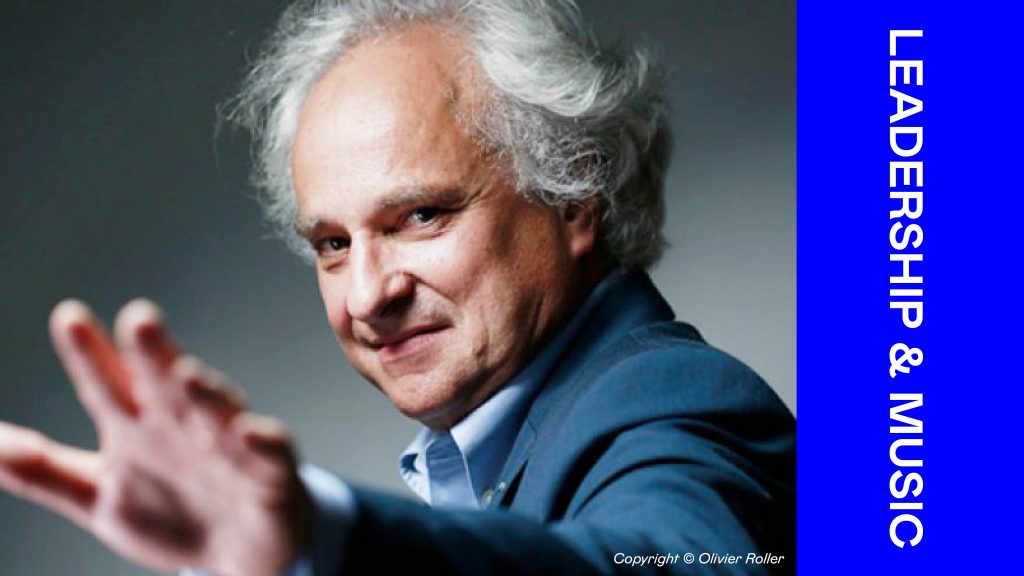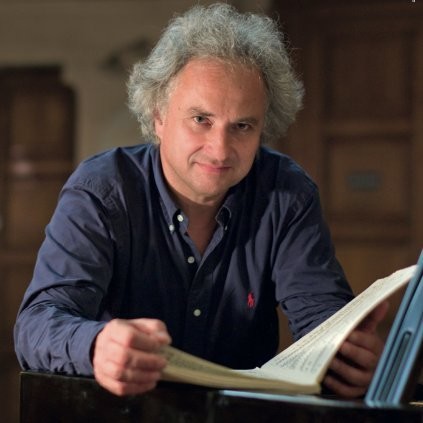Far beyond trivial analogies between orchestras and business organisations, there should be something to learn from top-class musicians who have been dealing with similar challenges as you, business leaders.
Yves Henry, one of the world’s top classical musicians and composers and a CEDEP Learning Partner, reveals some valuable lessons – orally transmitted since the dawn of humanity – musicians can share about leading self & organisations.
The connection between music and, let’s say, power, seems to be a very old story, as old as humanity… For millennia, musicians have quietly mastered the art of organisational harmony and transmitted it orally, from a generation to another. The more we explore the world of musicians, the more we can learn about leadership. The lessons are, in fact, so profound they can permanently shift and elevate our management mindsets.
“Music is a beautiful art form, but it’s rare for leaders outside of the music world to gain insights into the leadership challenges musicians have overcome for centuries. These two spheres rarely collide, and yet music can inspire us so much about successful leadership and what it takes to be an exceptional leader,” explains Yves Henry, one of the world’s top classical musicians and composers, and a valued CEDEP Learning Partner.
So, what are these valuable lessons? According to Henry, musicians can inspire leaders not only about how to create organisational harmony and generate followership, but also to be visionary, innovative and resilient.
Organisational harmony and creating followership aligns the group
When musicians play together, everyone knows why they are there and what their role is. “When you’re playing with a group of musicians or a conductor is leading the orchestra, musicians know and understand their part in the ensemble for the musical piece to sound as it is intended,” says Henry.
“We rarely discuss what we are playing. The music is so clear and well understood that we can all follow. For example, an excellent conductor doesn’t need to explain anything to the musicians because he knows what he wants to hear. And the musicians understand this very quickly as they can listen to the music getting better and better.”
“Great leadership is when what you play as a group is so clear and harmonious that others instinctively want to follow,” adds Henry.
Create emotion and meaning to connect and inspire with others
Exemplary leadership or musicianship is all about inspiring and connecting with others. It isn’t about being the best technically: it’s about being the best on emotion and meaning.
In the business world, we often see people in leadership roles who are technically accomplished at what they do, yet they cannot inspire or lead others. So how do we achieve this?
“I’ve been teaching for a very long time. Many of my young students are very good technically, but the audience isn’t as moved or emotional as it could be. These students don’t convey the sense of the music. Music is a language, and if the language isn’t clear, the audience won’t understand. The music goes over their heads and not to their hearts.”
“I have to give them the keys to connect all of these elements. What’s fascinating is that they don’t need to practice more; they need to understand how to connect all of the science they already know – how to play an instrument and analyse and then feel the music. Some students grasp this in only a few seconds, and the improvement is immediate. The key lesson here is that it’s not about how well you play. It’s whether or not your audience understands the music.”
“If the musical message is true and strong, the audience won’t hear the mistakes. But if the music is only technically perfect, without an emotional connection, then the audience will hear the mistakes.”
This lesson is very relevant to the business world. Being a successful leader is not just about KPIs, reports and deliverables. It’s also about the non-tangible things that create emotion, connect with others and inspire them.
Give a sense of meaning and purpose to improve performance of your team
Understanding the importance of vision also has a significant impact on performance. Many conductors use a concept or an idea to change the emotion and sound of a composition.
“The musical world is full of examples of conductors giving direction to orchestras, not by explaining but by creating a vision of how they want the music to sound. One famous example is when Carlos Kleiber, one of the world’s greatest conductors, was rehearsing a piece composed by Richard Strauss, a composer full of romantic emotions. In the old footage from the 1950s, you can see that the musicians are all earnest and conscientious. They play what is written, but they don’t understand the music, and Kleiber struggles to obtain the desired emotion.
He stops the rehearsal and appeals to their imagination by telling them to imagine playing for someone they want to please. Then musicians play again, and they play completely differently. This is the power of vision. Nothing changes within the organisation or the work but the point of view shifts.”
The lesson here is that you can change the performance of your teams by giving them an alternative vision or changing their point of view. When leaders have a clear vision and communicate with a sense of meaning and purpose, this opens and changes their team’s mindset, they feel more connected to the end goal, which improves performance.
Innovation is key for a great leader
According to Henry, musicians have also embraced innovation for centuries – a fundamental element of the world of music. When there are so many technically brilliant classical musicians who can all play from identical musical scores, it is essential to stand out from the crowd. That’s when a combination of innovation, interpretation and vision are so important.
“Any musician can play a technical piece of music, but they need to innovate to stand out from the crowd. Musicians work within the constraints of music and develop the necessary technical skills, but they innovate, interpret and create meaning,” says Henry.
Sometimes, this is difficult for leaders in the business world to find a room for innovation or creativity within their role or organisation but a creation of a space for innovation would help them to be a great leader.
Preparation, resilience and overcoming failure as a necessary step
Musicians can also teach leaders so much about resilience and overcoming failure. Henry has been playing the piano all day, every day since he was four years old, with so many successes and failures along the way, ultimately taking him to the pinnacle of his career.
“To be a great musician involves a certain amount of talent, but after that, preparation and a lot of hard work are crucial. This is a vital lesson and one of the most difficult to explain to young people because they want to be incredible straight away. But it takes a lot of time, and you need to be self-disciplined and resilient,” he says.
“Good leaders need to fail to succeed, and this is the only way to build resilience”.
Having a clear mental picture of what you want to achieve to succeed and sweep away stress
Without a doubt, performing successfully solo in front of thousands is also a huge lesson in stress management. Henry’s ability to manage this stress is inspiring. So how does he stay calm? It’s about envisaging what you are going to play before you play it and gaining confidence in this way. So much preparation in music is about preparing intellectually. This simple belief of having a clear mental picture of what you want to achieve is not common in management science, but it’s the making of visionary leaders and successful musicians.
“When I was young, I had lessons with Aldo Ciccolini the most incredible teacher. I arrived for my lesson one day, and he was running late. I got chatting to a painter who’d been at his house working all week, and I said to him, ‘You’re so lucky being able to listen to this amazing pianist every day while you work!’ And he said, ‘No, I haven’t heard him play once!”
“So, I asked my teacher, ‘Master, how are you so accomplished and yet you don’t play every day?’ And he taught me one of the most important lessons of my career. He said to me, ‘First when I learn music, I learn in my head so that I can hear the perfect version. I use my imagination and take the music as far as possible. And when the music is evident in my head, only then do I begin to practice.”
“I understand this so clearly now because when you practice, you only practice something you already know. You know what the result will be. But the problem is your hands and arms have memory – and if you practice in the wrong way, it’s more difficult afterwards to play in the right way. That day when my teacher was late, I learned a lot.”
In the same way musicians visualise the music, leaders in the business world need to be able to prepare intellectually to solve business challenges. This includes having a sense of where they are going, being empowered and sharing with others to empower them as well.
The importance of the humility in the leadership
Musical leaders are also renowned for helping others become better at their craft, making others look good and showing humility. Henry was privileged to play with Yehudi Menuhin, and he explains that not only was he a great violinist, he was also an incredible and inspiring leader.
“Yehudi Menuhin was a great person. The only time I played with him was an exceptional experience because it was in jail. He had created a foundation for young musicians, taking music into prisons and other places such as hospitals. We were performing in a chamber music quintet, and we had rehearsed before but without maestro Menuhin.”
“He was running late, and when he arrived, he took his Stradivarius and asked me for an A to tune his violin. He then discretely asked me, ‘What’s your tempo?’ Which meant, give me your tempo, and I will follow you. Because he had just arrived, he knew it was easier for him to follow us than it was for four people to follow him.
“He was a great person, and this was a great experience for me. It was an experience of humility and realism, and of course, we all played very, very well with him.”
The ultimate and rewarding step for a leader, transferring your knowledge and becoming a coach
In the music world, leaders are happy to transfer their knowledge – a practice that has been taking place for centuries. In the business world, this practice is now referred to as ‘leaders as coaches’. This terminology is not needed in music as the transfer of soft, emotional and technical knowledge happens instinctively. In summary, the world’s most excellent musicians are also perfect coaches.
“When I play with others, there are often different levels of experience. We instinctively follow better players and guide younger, less experienced players, passing on our experience and knowledge. In short, it’s about successful teamwork. Musicians in leadership roles don’t see other musicians as a threat to their position. We work in harmony. We build each other up. That’s what makes a successful organisation,” says Henry.
Musicians have been passing on their knowledge for thousands of years and know how to do it, which is something leaders are beginning to do. One more reason to listen what musicians can share about leading self & organisations.
Through the experiences and stories shared by the one of the world’s top classical musicians and composers, Yves Henry, we realise that there is so much to learn as leaders about leadership from the top-class musicians.
At CEDEP, we offer you the privilege of receiving these valuable insights and perspectives.
Do you want to be privileged?
Join us in the Leading Fortissimo experience, a unique interactive leadership development journey.
This programme is designed and co-directed by our Learning Partners Yves Henry and Christophe Gillet. Christophe is the former Head of Innovation at Sony Business Europe. He designs and directs numerous highly original and unorthodox programmes at CEDEP.
Leading Fortissimo experience
At CEDEP, we are privileged to work with Yves Henry as a valued Learning Partner and Co-director of Leading Fortissimo, one of our most engaging and innovative course experiences where we explore what classical music can teach us about the true meaning of leadership.
Co-directed and co-designed with Christophe Gillet, CEDEP Learning Partner and former Head of Innovation at Sony Business Europe, Leading Fortissimo takes attendees on a leadership journey around a grand piano. Henry illustrates his leadership insights with live music moments, and Gillet applies these insights to practical leadership tools and concepts.
“Leading Fortissimo is not your average masterclass with a set schedule. This illuminating intellectual experience provides a rare opportunity to ask questions of a master pianist, drawing parallels between the incredible world of classical music and leadership in today’s modern business world,” explains Gillet.
“There is so much we can learn from our master musicians, and it’s a privilege to be involved and to facilitate this transfer of precious knowledge and perspectives.”
Click here to know more about our Leading Fortissimo programme


